 Petzlover
PetzloverBoth Manchester Terrier and Turnspit Dog are originated from United Kingdom. Both Manchester Terrier and Turnspit Dog are of same height. Manchester Terrier may weigh 10 kg / 22 pounds lesser than Turnspit Dog. Both Manchester Terrier and Turnspit Dog has same life span. Both Manchester Terrier and Turnspit Dog has same litter size. Both Manchester Terrier and Turnspit Dog requires Low Maintenance.
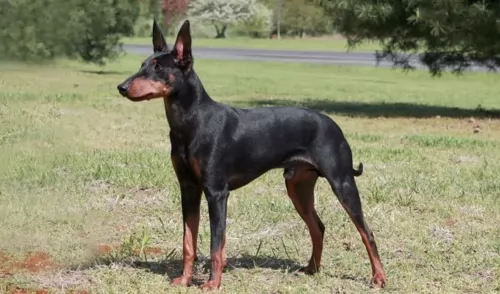 Looking much like the Black and Tan Terrier, the Manchester Terrier is a dog that was actually developed from the Black and Tan, which is the oldest known breed of terrier.
Looking much like the Black and Tan Terrier, the Manchester Terrier is a dog that was actually developed from the Black and Tan, which is the oldest known breed of terrier.
In the United States there are 2 varieties of the Manchester Terrier — the Toy and the Standard but in the UK the 2 sizes are classified as different breeds - the English Toy Terrier and the Manchester Terrier.
The dog was first bred in the 19th century to wipe out rats and mice, originating from Manchester, England. This is an old dog breed, gaining the nickname of the Gentleman's Terrier because of its dignified looks and personality.
After the 2nd World War, the numbers of the dog dropped and this spurred the kennel club to list it as a vulnerable native breed, in danger of extinction. It was in 1937 that the British Manchester Terrier Club was formed.
It is amazing that this small dog’s popularity comes from him being used in the kitchens to roast meat. The British enjoyed eating their meat which they roasted on a fire.
These dogs were essentially regarded as a tool – a means to an end, and when kitchens were modernized, they were no longer needed, and they became extinct.
Referred to as the kitchen dog or cooking dog, the first mention of these little dogs was made in 1576. By 1850 the dogs had become scarce and by 1900 it seemed as though there were none left.
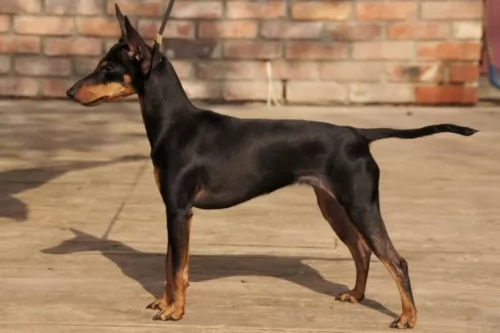 The Manchester Terrier is a small, smooth haired dog with a black and tan coat and a head with a fairly long muzzle, small bright eyes, largish erect ears and a deep chest.
The Manchester Terrier is a small, smooth haired dog with a black and tan coat and a head with a fairly long muzzle, small bright eyes, largish erect ears and a deep chest.
The body is lean and muscular and the tail, where once docked, now tends to be left long. In the toy sized dog you will find him standing at roughly 25 – 30cm in height and he will weigh between 2 to 4kg. The standard sized dog will be slightly taller and heavier and weigh in the region of 8kg.
You can expect between 2 – 4 puppies from a breeding pair.
Feisty, energetic, alert and intelligent are some of the words which describe the Manchester Terrier. Like any other dog, training and socialization will make him a splendid pet, obedient and amicable among people.
He is loving and loyal, courageous and feisty and guaranteed to make you an eager-to-please pet. He can adapt to life in the city or countryside, but is going to need plenty of exercise wherever you keep him as a pet.
The Turnspit was a small long-bodied dog, standing at between 20 to 30cm in height and probably weighed anything between 9 and 14kg in height.
The legs were somewhat crooked or bandy and Edward Jesse, who wrote ‘Anecdote of Dogs’ in 1846 described them as ugly dogs with a miserable look to them. That was probably due to him having to fit into the hamster-like wheel contraption that turned the meat being roasted in the kitchens.
They were low-bodied dogs, similar to a Dachshund or a Corgi with short, stocky legs, short floppy ears, and a short coat. The long tail curled over its back. It is believed that the coats were white, reddish-brown, gray or black.
The dog was certainly feisty, energetic and hard-working with not much being written about his temperament. He was a working dog, but given the chance, he would no doubt have been loving and loyal, longing for the chance just to be part of a human family and to be loved.
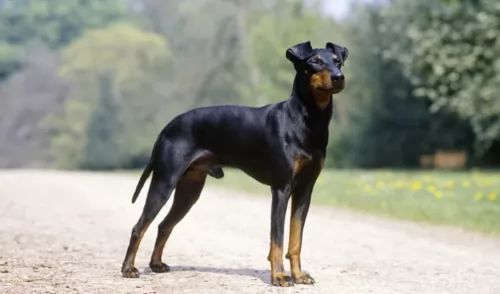 The Manchester Terrier has so many good qualities that make him such a good pet. Low maintenance, he is clean and well groomed to look at. He is also a healthy dog breed, nice and active and low maintenance.
The Manchester Terrier has so many good qualities that make him such a good pet. Low maintenance, he is clean and well groomed to look at. He is also a healthy dog breed, nice and active and low maintenance.
This little dog is willing to come into your home and heart. He will make you a wonderful pet and friend for as long as 15 years if you take special care of him.
The Turnspit dog had a tough life, but would no doubt have made a wonderful little pet had he just been allowed to be a companion dog.
Make sure that when you buy a dog, you don't just put him in your backyard and forget about him. Give him the love and care he deserves.
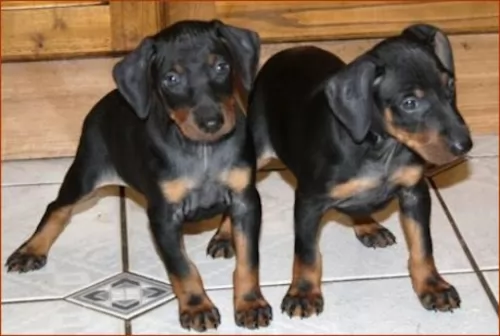 This dog breed is fairly healthy and can reach a good age if looked after well. Every dog though, can be affected by a number of inheritable genetic disorders.
This dog breed is fairly healthy and can reach a good age if looked after well. Every dog though, can be affected by a number of inheritable genetic disorders.
Glaucoma is a common genetic condition in Terrier breeds, including the Manchester Terrier. Secondary glaucoma, which is known as lens luxation is brought about when there is excessive pressure in the eyeball. The lens of the eye is put out of alignment. Most times surgery is the solution.
Von Willebrand's Disease is a blood disorder that affects the clotting process. A dog with this disease will have bleeding gums, continuous bleeding after surgery and sometimes blood in the stool. It’s a disease which can’t be cured but it can be managed with treatments.
The health and lifespan of a dog is influenced by quite a few things such as food, care, love, exercise and the type of breed it is. Generally smaller dogs live longer than big dogs, and mixed breed dogs live longer than pure breeds.
The Turnspit dog, if he had received the proper care, could have lived to between 10 and 15 years of age.
Stress can bring on a sudden drop in blood sugar. The Turnspit had reason to be stressed, working hard in horrible conditions. Dogs become weak and lethargic and can scarcely maintain an even gait. A sudden drop in blood sugar can cause a small dog to go into a fatal coma.
This ailment seems to occur more often with smaller dogs. The pancreas becomes inflamed and your dog has vomiting, diarrhea, abdominal pain and dehydration. Pancreatitis can come about because of trauma, metabolic disorders or infection.
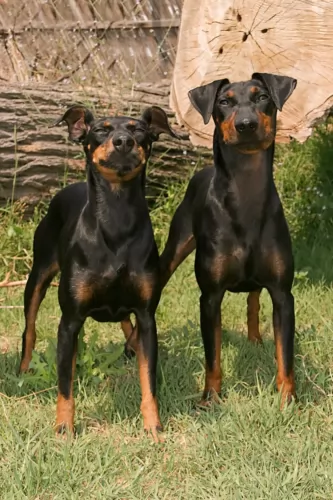 Low maintenance, the Manchester Terrier will only require a brushing once or twice a week. Check his eyes and ears for infections, clip his nails and brush his teeth 2 or 3 times a week.
Low maintenance, the Manchester Terrier will only require a brushing once or twice a week. Check his eyes and ears for infections, clip his nails and brush his teeth 2 or 3 times a week.
The Manchester Terrier is a lean, muscular dog and you want to be sure to keep him that way. If you feed him commercially manufactured food, make sure that it is one of the high quality brands – food which is packed full of vitamins and minerals to ensure the health of your dog.
Any packaged food you buy should be appropriate to the dog’s age and his activity levels. You won’t be doing your dog a favor by feeding him treats that you enjoy such as chocolate, coffee, peanuts, raisins, grapes and onions.
Dogs want simple food that don’t change much. Keeping things simple prevents upset stomachs. Give him some wholesome home-made food occasionally to add into his dry kibble. This can be boiled chicken, brown rice or pasta and some cooked or raw vegetables such as potatoes, carrots and spinach. Some raw meat added in from time to time can also do wonders for your dog. Make sure he has access around the clock to fresh, cool water.
The Manchester Terrier wants lots of exercise, and apart from him having his regular daily walks, he will need runs off the leash in the park. If you go cycling for instance, he will readily run beside you.
A dog is man's best friend, but the Turnspit was essentially just a working dog and most likely didn’t receive the proper care he deserved.
Small dogs like these would have had basic needs. Their owners would have had to pay attention to the dog's health, because he needed to work.
We look at ways in which a small dog like the Turnspit should have been cared for -
One wonders if the Turnspit was allowed to eat any of the roast meat he worked so hard on to get ready. Every dog should have a regular meal.
Most adult dogs should be fed 2 meals of kibble a day. If the Turnspit wasn’t extinct he would have required a high quality ‘small dog breed’ commercial dog food. Home-made food would also be a requirement – some boiled chicken, brown rice and vegetables. Dogs want and appreciate simple, wholesome foods that won’t upset their digestive systems.
Along with good food, dogs need cool, fresh water constantly available to stay healthy.
Make sure he gets to the veterinarian if he is sick, but also for his vaccines to prevent him from getting some of the worst dog diseases there are.
Groom your small dog regularly. The Turnspit had a shortish coat and would have required a brush twice a week. Other grooming procedures for a small dog like the Turnspit would have been keeping his nails trimmed and checking the inside of his ears and his mouth for ear infections and dental disease.